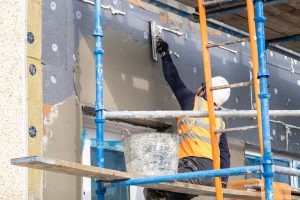Using Home Purchase Regulations To Grow The Market For Clean Heating in Scotland
Report by Changeworks and Nesta Scotland
The Scottish Government’s 2023 consultation on proposals for a Heat in Buildings Bill included an ambitious and innovative idea: requiring homeowners in Scotland to install clean heating systems after purchasing a property, within a couple of years of the property transaction being completed.
By linking action to the home buying process, this point of purchase (PoP) requirement aimed to accelerate Scotland’s transition away from fossil fuel heating.
Changeworks partnered with Nesta, the UK’s innovation agency for social good, to explore the potential impacts of the PoP policy.
The research found that, with strong safeguards in place, it could deliver substantial growth in clean heat installations, mobilise low-cost private finance (either through home equity or mortgage lending), allow public subsidies for clean heating to be prioritised for those with greatest need and support a fairer distribution of costs.
By design, the policy would impact the housing market, as it seeks to reward homeowners making clean heating upgrades with higher property values.
However, with the right mitigations in place, the policy would be viable, without resulting in disproportionate adverse impacts on the housing market or on specific groups of home buyers.
Authors: Fabrice Leveque (Changeworks); James Conway (Changeworks); Jade Taylor (Changeworks); Robin Parker (Nesta); Codrina Cretu (Nesta).
On this page:
Key findings
- Between 16% and 60% of annual property transactions could be subject to the PoP, depending on exemptions. This would deliver 16,000-60,000 additional clean heating installations per year, compared to the 6,000 installations in 2023.
- Property prices are likely to adjust, with compliant homes becoming higher in value compared to non-compliant homes; impacts would vary by area but are unlikely to significantly affect the national average price.
- Home moves could be slightly reduced, as clean heat installation costs may discourage transactions in a similar (but opposite) way to how property transaction tax cuts encourage them.
- Low-equity buyers, such as first-time buyers, could face borrowing limits without support, but exemptions, grants and/or loans could effectively mitigate this risk.
- Market-level impacts (lower transaction volumes, slightly lower property prices) could be modest, resembling mild past periods of housing market stagnation rather than severe shocks.
Mitigations proposed
Successful implementation of the policy will require consideration of key risks to the housing market. The following policy mitigations are identified as necessary to ensure that impacts are both managed and not disproportionately adverse:
- Ensure clean heating upgrade costs are a small proportion of the value of properties affected by the requirement. This could be achieved through a mix of low-value property exemptions, government grants to cover upfront costs, or a cap on upgrade costs.
- Exempt lower-value homes from the requirement. The study estimates that the requirements could still deliver results with an exemption for lower value properties. Existing property tax thresholds could be used (e.g. up to £145,000 and an initial short-term exemption for those less than £250,000).
- Provide higher levels of financial support for low equity buyers, such as first-time buyers. This could include enabling higher loan-to-value mortgages, specific low-interest or interest-free loans, and/or grants.
- Work with mortgage lenders to adapt lending practices and make it easier to finance clean heat upgrades.
- Reduce the costs of heat pumps by continuing to provide upfront grants and by reducing electricity costs (e.g. by reforming energy bill levies and improving electricity market design).
- Improve buyer information by, for example, adding indicative upgrade costs to Home Reports or developing online tools.
- Exempt all or most flats to avoid technical challenges and the difficulties of gaining permission or consent from neighbours unaffected by the requirement.
Recommendations
The study finds that, if designed with strong mitigations, the PoP requirement remains a viable and valuable tool to grow clean heating installations in Scotland.
PoP provides a scalable boost to clean heat demand in the medium term, but as it only applies when homes are bought, it contributes less to long-term targets.
For this reason, it should be introduced alongside complementary policies, including the phase-out of new fossil fuel boiler installations and the clean heat market mechanism, which requires boiler manufacturers to sell a growing proportion of heat pumps alongside traditional boilers.
Together, these measures would create stronger market signals and ensure a fairer, more affordable clean heat transition.




